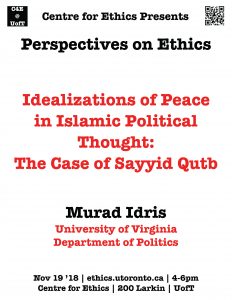
Idealizations of Peace in Islamic Political Thought: The Case of Sayyid Qutb
“Before us today is the problem of universal peace,” Sayyid Qutb declares in the prologue to his much-neglected Universal Peace and Islam (1951). “Does Islam have an opinion on the matter? Does Islam have a solution?” Albeit popularly considered the ideologue of “Islamic jihad,” the Muslim Brotherhood’s leading theorist designed a plan for universal peace. Qutb’s plan pegs the emergence of universal peace to an immanent organization of individual states with laws in common. Its promise of peace is embedded in an Enlightenment script that claims to correct unjust savagery through the state and the law. This is a script that calls up Immanuel Kant and Thomas Hobbes, specifically their predications of peace upon law and statehood. Drawing attention to Kant’s discussions of “the Arab” and Hobbes’s references to empire, this talk unpacks the unacknowledged salience of denials of law, political economy, and settler-colonialism for theorizations of peace. Qutb’s adaptations of that familiar logic unwittingly expose its limits, culminating with perpetual war against enemies whose laws and form are ‘wrong. This talk draws on a chapter of Idris’s book, War for Peace: Genealogies of a Violent Ideal in Western and Islamic Thought, published by Oxford University Press in Fall 2018. This book deconstructs dominant formulations of peace in the writings of Plato, al-Farabi, Aquinas, Erasmus, Grotius, Gentili, Hobbes, Ibn Khaldun, Immanuel Kant, and Sayyid Qutb.
☛ please register here
Murad Idris 
University of Virginia
Department of Politics
Mon, Nov 19, 2018
04:00 PM - 06:00 PM
Centre for Ethics, University of Toronto
200 Larkin
